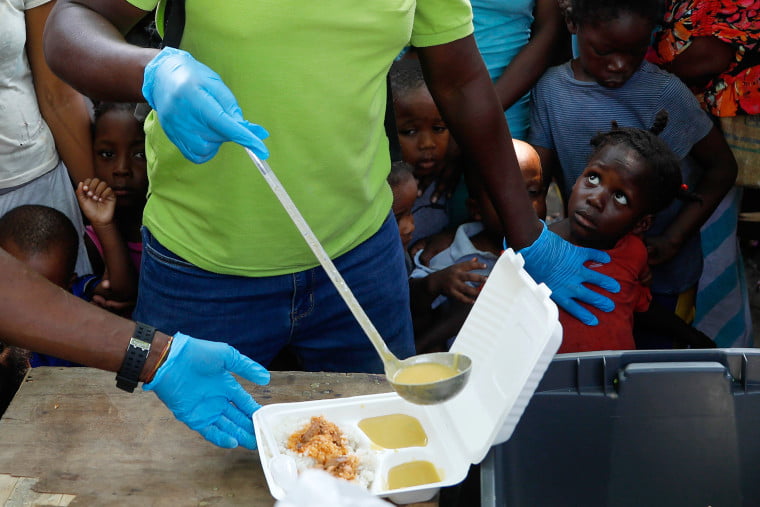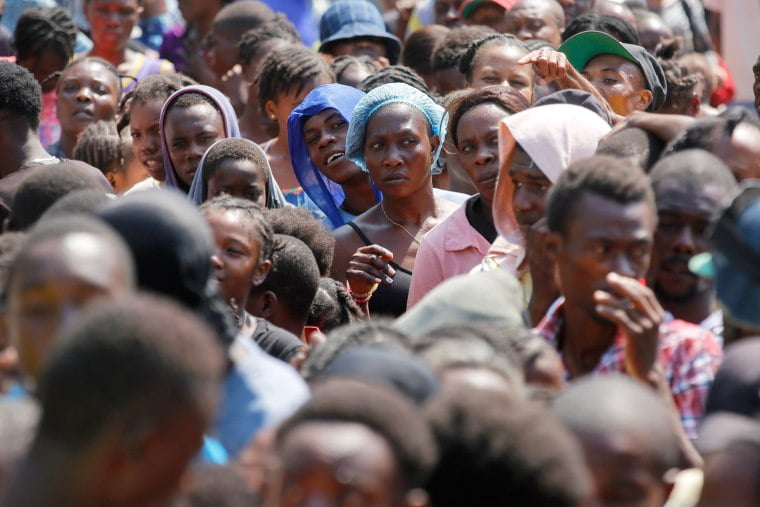Humanitarian help, according to Haitian citizens and those who support them, should concentrate on bolstering the work that Haitians are already undertaking locally.
In Short
- Haitians advocate for sovereignty in managing humanitarian aid.
- Grassroots organizations crucial for effective assistance.
- Political turmoil worsens crisis, necessitating urgent global support.
- Calls for aligning international aid with local needs and priorities.
TFD – Dive into the critical discussion on Haitian sovereignty amidst escalating humanitarian challenges. Explore the role of grassroots efforts in driving impactful solutions with TheFoxDaily.
Monique Clesca is far from the epicenter of violence in the lowlands below Port-au-Prince, living in a suburban neighborhood in the highlands. However, Clesca expressed her concern that the armed factions who occupy a large portion of Haiti’s capital city may follow through on their threat to ascend into the hills and unleash mayhem.
According to Clesca, she spends much of her time at home.
“Many retail establishments have closed.” Last Saturday, I spent thirty minutes at the grocery store, simply in and out. “I quickly left,” she said to NBC News. She said farmers and fishermen based in the rural areas outside the capital have not been able to bring their goods to Port-au-Prince for weeks. “There is a lot of poverty,” she said.
Haitian residents facing poverty and even starvation are desperate for food, shelter and medical supplies as political tensions grow and violence continues to escalate. Much aid is needed, but advocates and residents say the best humanitarian aid is one that supports the work of grassroots groups already established and helping civilians every day. Foreign aid, they say, usually falls into the hands of armed groups.
After its de facto leader announced his resignation, Haiti’s long-standing political turmoil and catastrophic humanitarian situation have reached a breaking point. Residents dread armed gangs that control everything, including where they may travel securely and what resources they can access, amid the uncertainty. But people have been trying to flee Port-au-Prince, the epicenter of the violence, for well over a year, and about 160,000 people have been displaced in the last several months, according to the U.N. Violent armed groups have occupied the Autorité Portuaire Nationale, the country’s largest port, obstructing access to most humanitarian aid.

In response, the United Nations declared on Thursday that it will build an air bridge between Haiti and the Dominican Republic to ensure that resources reach the country; the European Commission has also committed 20 million euros to Haiti; and the Biden administration has pledged $33 million. The two nations’ border is now closed.
While it appears that foreign countries are giving out a lot of money, Greg Beckett, an associate professor of anthropology at Western University in Canada, told NBC News that this does not always guarantee the aid will get to the people who need it.
“Money commitments are common; whether or not the money is really distributed is one matter. Beckett, who has worked in Haiti on and off for years, told NBC News that the money would go to the government. “You have an entirely unconstitutional government in Haiti that is not accountable and it’s not really clear how it’s spending any of that money,” Beckett said.
According to Beckett, after the gangs took control, they stormed the Autorité Portuaire Nationale and looted the cargo containers kept there. “There’s always a chance to seize the food as it comes in,” he stated.
Nevertheless, there are already functioning organizations on the ground, many of them led by Haitians who are aware of the nuances of the nation. Throughout the recent crisis, Fokal, Fonkoze, and Partners in Health, an international NGO with many facilities and nearly all Haitian teams employed, have continually collaborated with people inside and outside of Port-au-Prince.
The program director of Rasin Devlopman and co-founder of Gwoup Konbit, two groups that promote resource sharing, solidarity, and sustainable, Haitian-led development, is Louino “Robi” Robillard, a community development activist from Haiti.
Our mission is to enable rural residents to make the most of their available resources. Grow more food, cultivate the soil, and search for resources inside their own communities, according to Robillard.
“People must have a comprehensive perspective on progress. We want to dispel the myth that Haitians are a helpless, suffering people. Despite everything we’ve had to deal with, Haitians remain a highly resilient people. People are together, which is why we can still stand,” Robillard continued.

Over the years, long-standing organizations like Doctors Without Borders and the World Food Program have established themselves in the nation and are able to offer support despite the unrest. Even in the face of armed break-ins at their medical facilities and attacks on their ambulances, Médecins Sans Frontières, often known as Doctors Without Borders, continues to provide medical care to the most affected districts of Port-au-Prince. In the meantime, a recent news release states that as of March 12, 14,000 displaced persons have received 62,000 hot meals from the World Food Program. The Kingston Whig-Standard was informed by Jean-Martin Bauer, the organization’s country director for Haiti, that the organization depends on a regional supply chain to maintain its operations.
He remarked, “We don’t have any vulnerability in our supply chain linked to gang attacks on infrastructure because it is local farmers providing food to local schools.”
Author of “Aid State: Elite Panic, Disaster Capitalism, and the Battle to Control Haiti,” Jake Johnston is a researcher at the nonpartisan Center for Economic and Policy Research. He believes that collaborating with local organizations and supporting local initiatives will help sustain long-term growth and reconstruction efforts even when foreign funding stops.
The main form of assistance that is available throughout the nation is Haitians helping other Haitians. Purchasing locally produced goods is one method that external actors can assist those players, according to Johnston.
He continued, “It’s not just about how to get food into the capital; it’s also about how to support farmers in rural areas so they can get food to the capital.” Humanitarian help shouldn’t be a “short-term solution that causes long-term problems,” he added.
As the nation works to recover from two horrific earthquakes in 2021 and 2010, which claimed the lives of about 220,000 people each, the problem in Haiti is developing. After decades of terrible dictatorships plaguing the nation, the death of democratically elected President Jovenel Moïse in 2021 further strained the already unstable administration. With the support of the United States and a number of other countries, Ariel Henry assumed the position of unelected prime minister and head of state. His unpopularity increased further when armed groups that were already present in Port-au-Prince escalated the violence in the past year and he postponed the presidential election to replace Moïse.
Based on data from the Uppsala Conflict Data Program at Uppsala University in Sweden, these groups—which include paramilitary and former police officers—are responsible for the increase in killings, kidnappings, and rapes that have occurred since Moïse’s passing.
Clesca and many other Haitians believe that instead of foreign authorities who have disregarded their views and wishes over and over, Haitians should be in charge of finding their own solutions. Clesca established the Commission to Look for a Haitian Solution to the Crisis in 2021 alongside lawyers, women’s rights organizations, religious leaders, humanitarian workers, and more. The commission has proposed a two-year interim government with oversight committees tasked with restoring order, eradicating corruption and establishing fair elections.
Haitians need to be in charge, according to Clesca. “There’s a really important part of sovereignty,” she stated. “Yes, we must collaborate with various partners, and yes, we will require assistance; however, they have no right to determine the nature of that assistance or the timing of its provision.”
Conclusion
The crisis in Haiti highlights the imperative of respecting Haitian sovereignty and supporting local initiatives for sustainable development. Let’s work together to empower communities and rebuild a resilient Haiti.
Connect with us for the Latest, Current, and Breaking News news updates and videos from thefoxdaily.com. The most recent news in the United States, around the world , in business, opinion, technology, politics, and sports, follow Thefoxdaily on X, Facebook, and Instagram .
